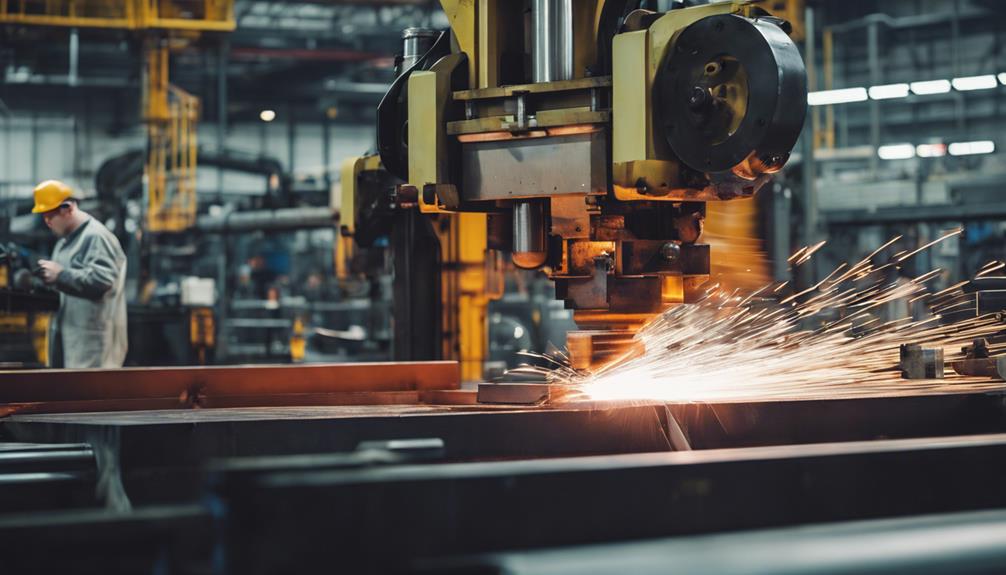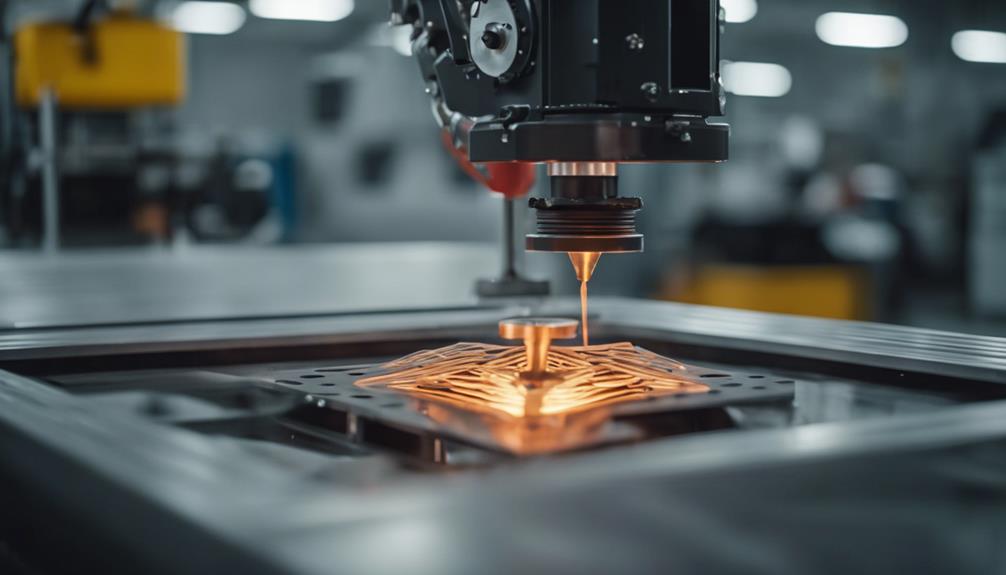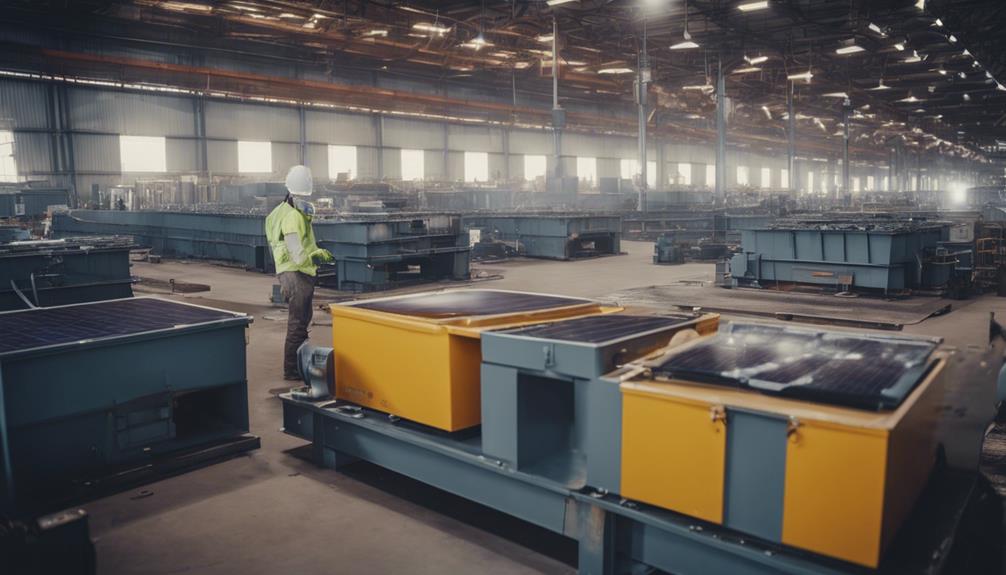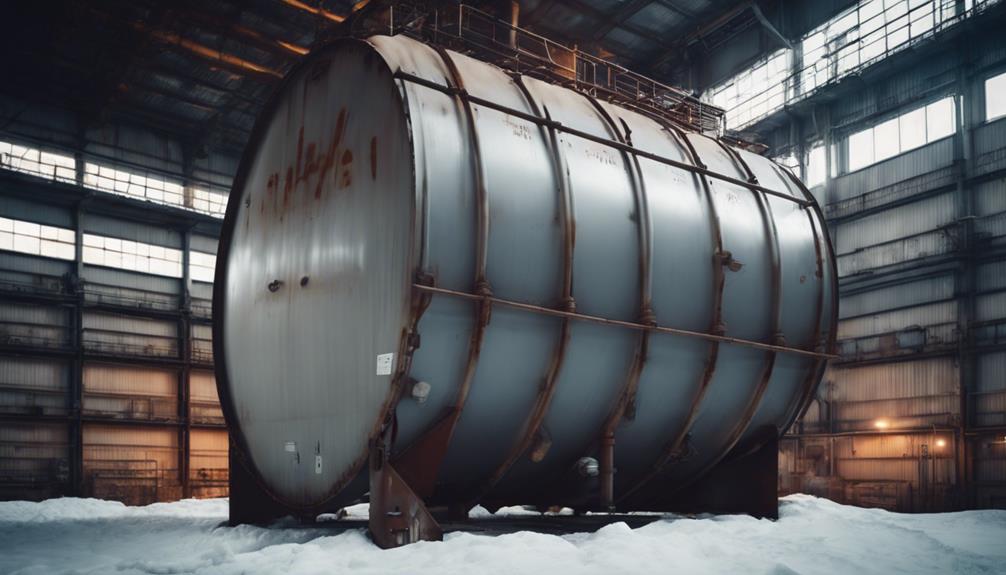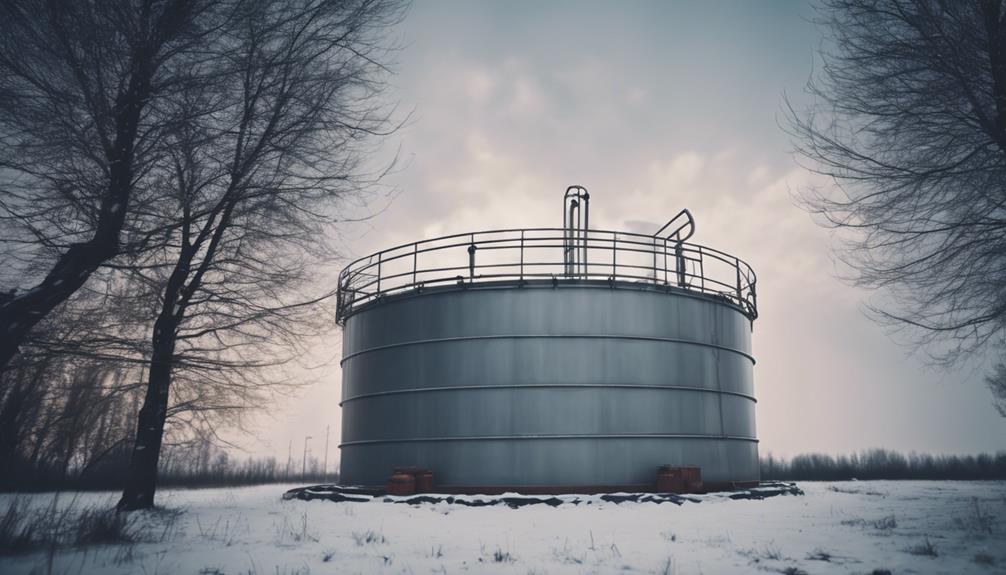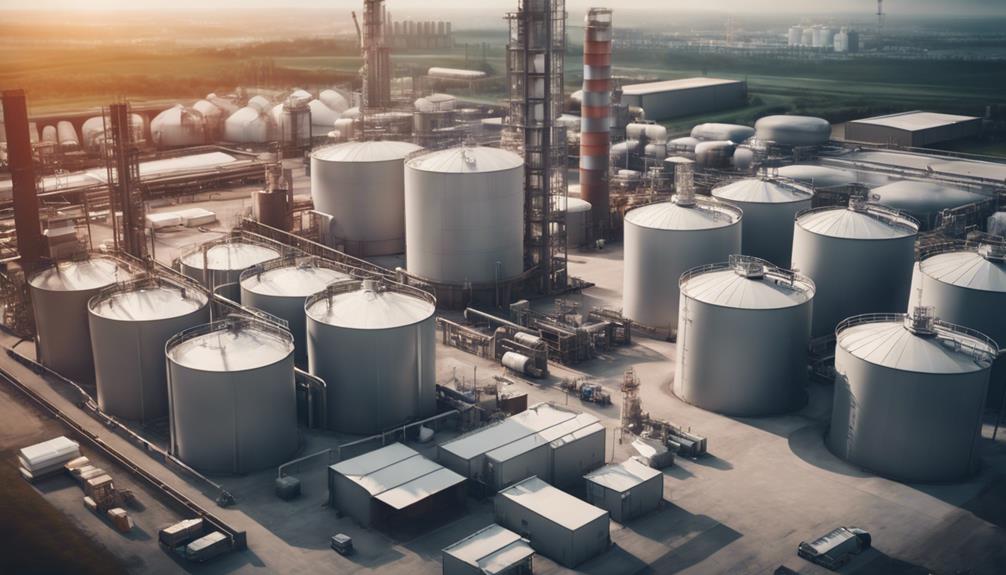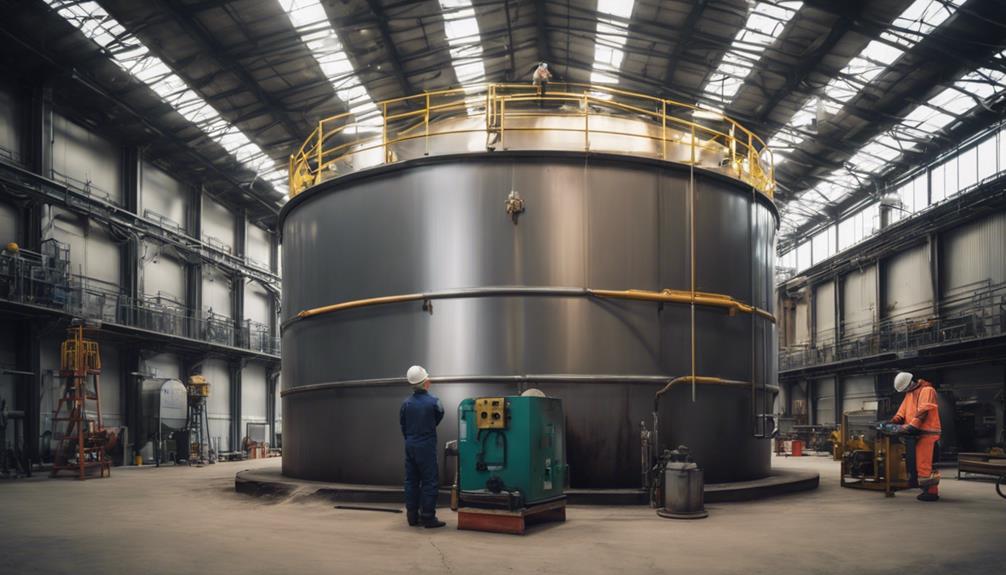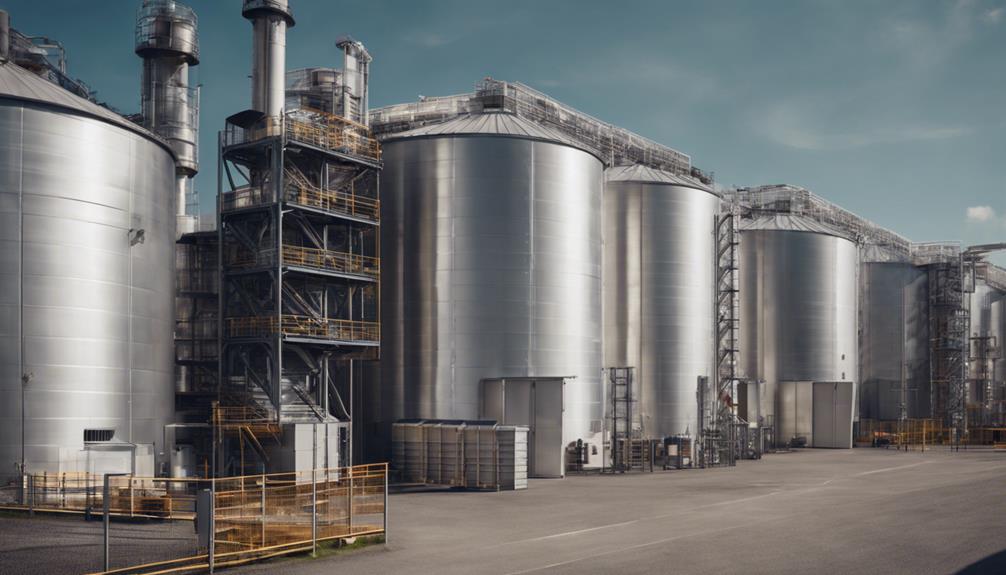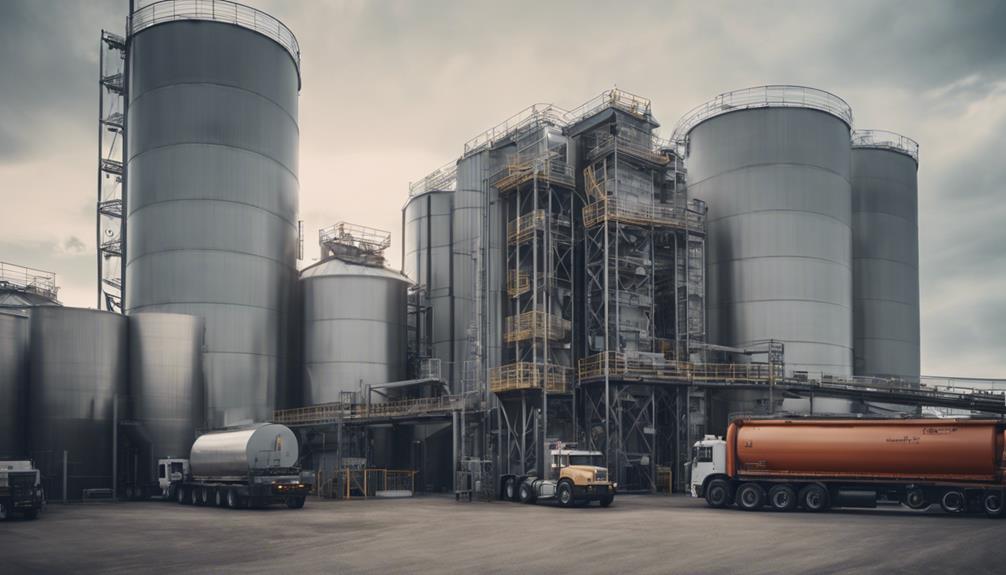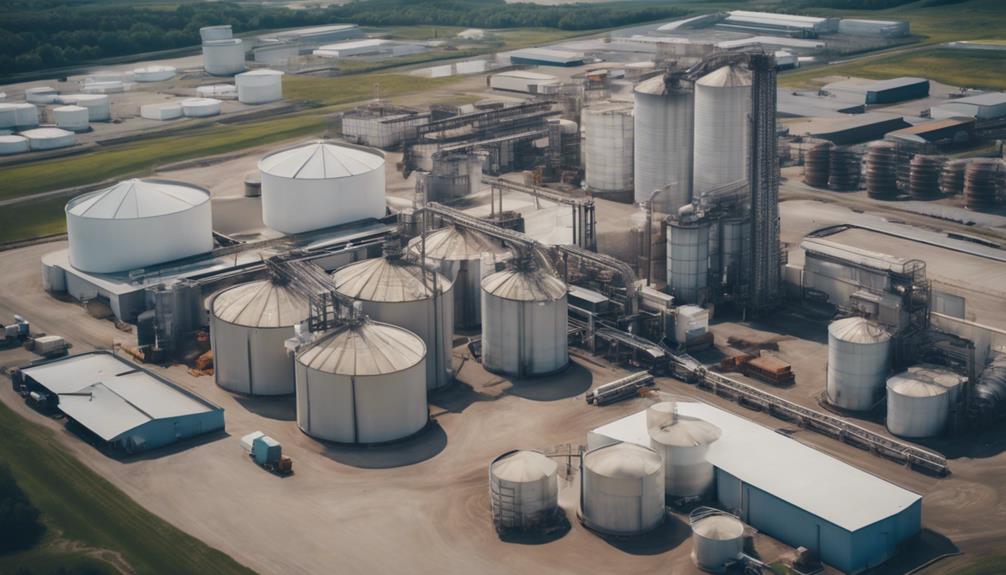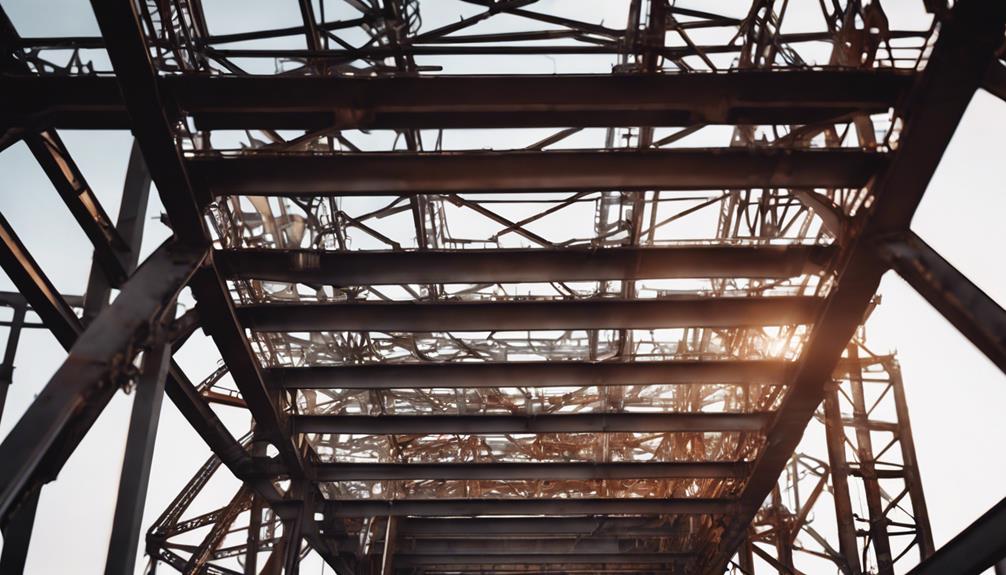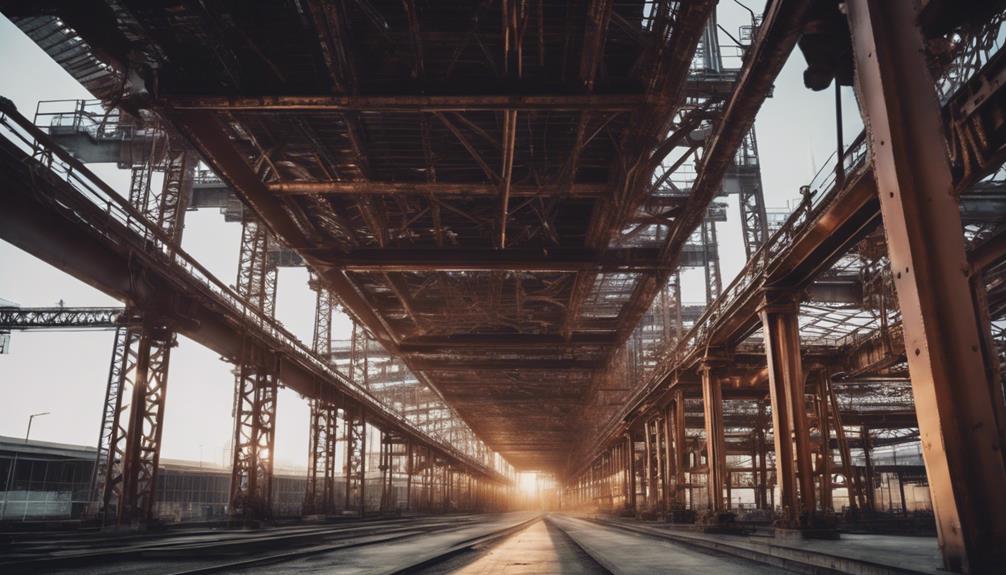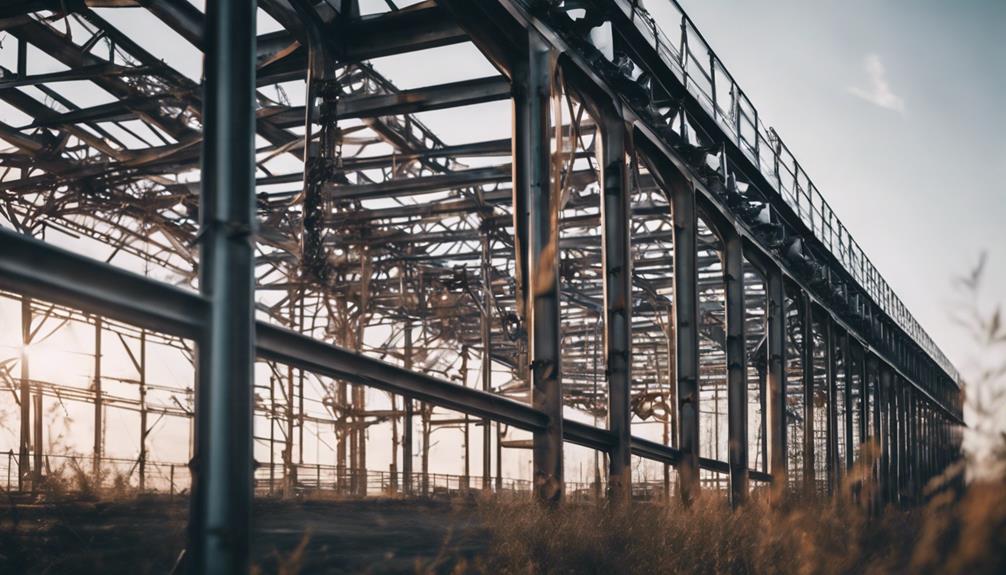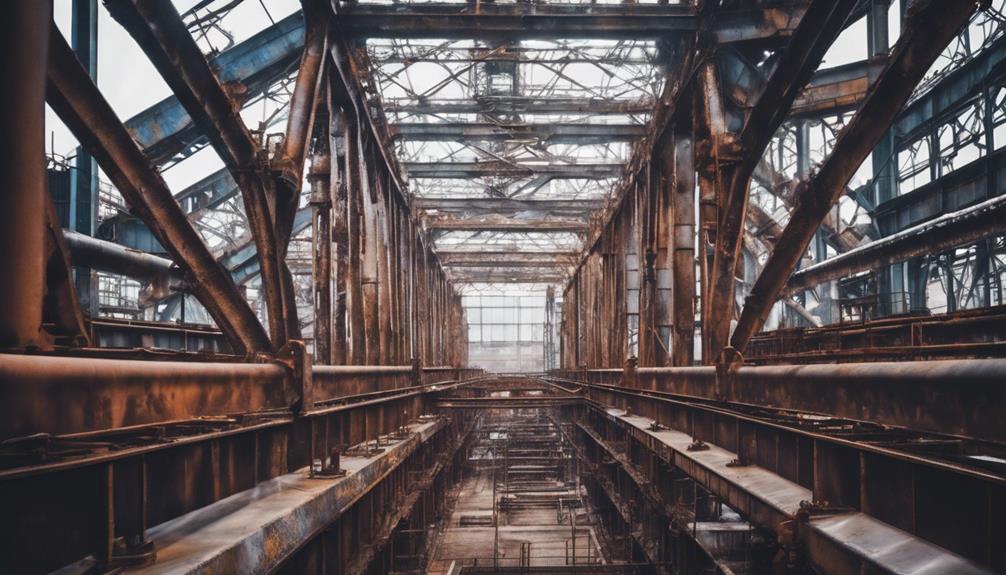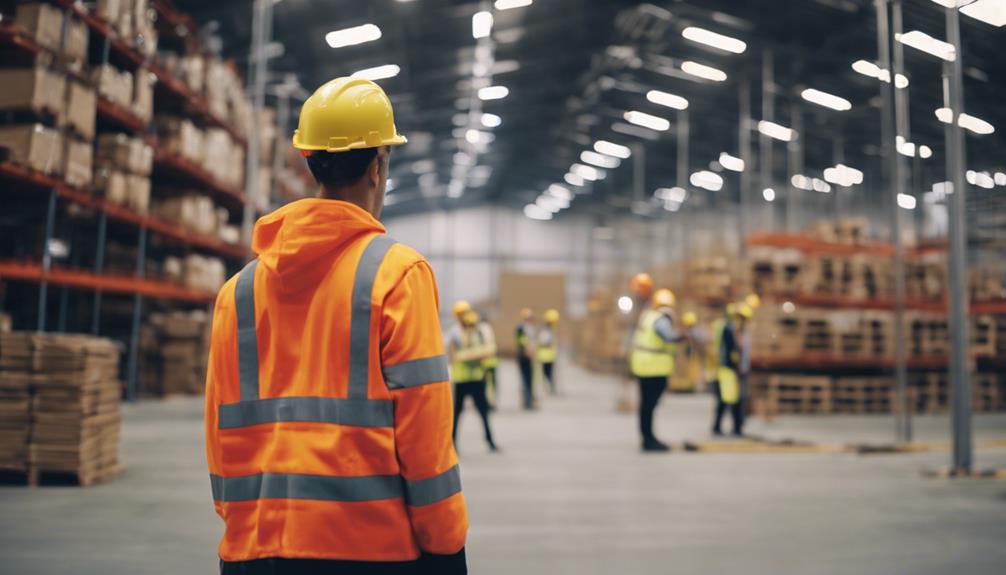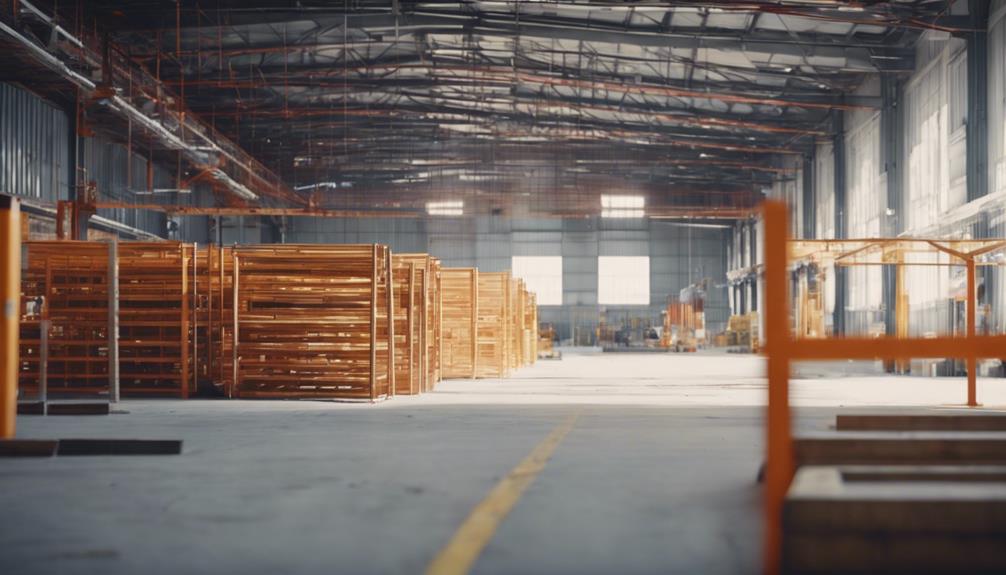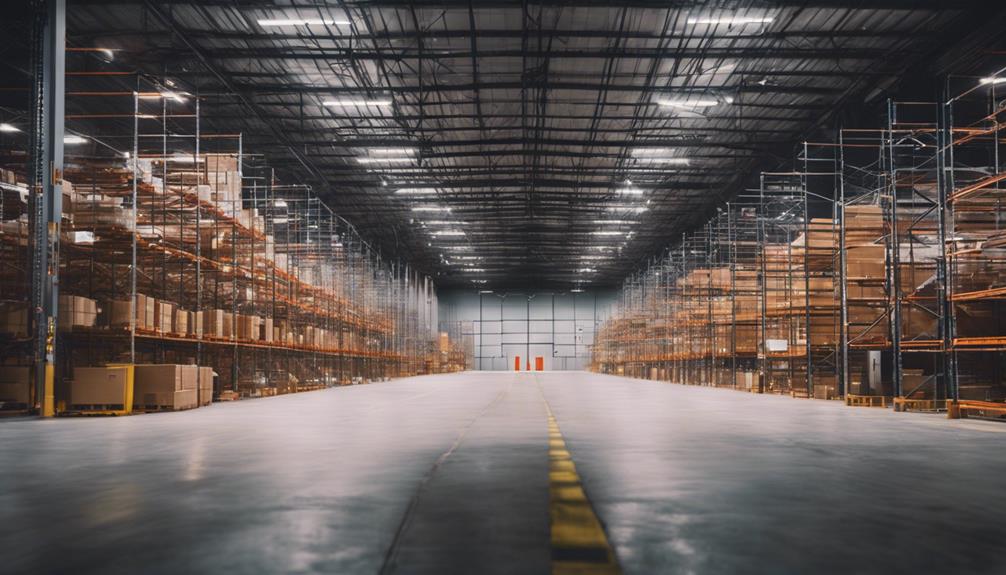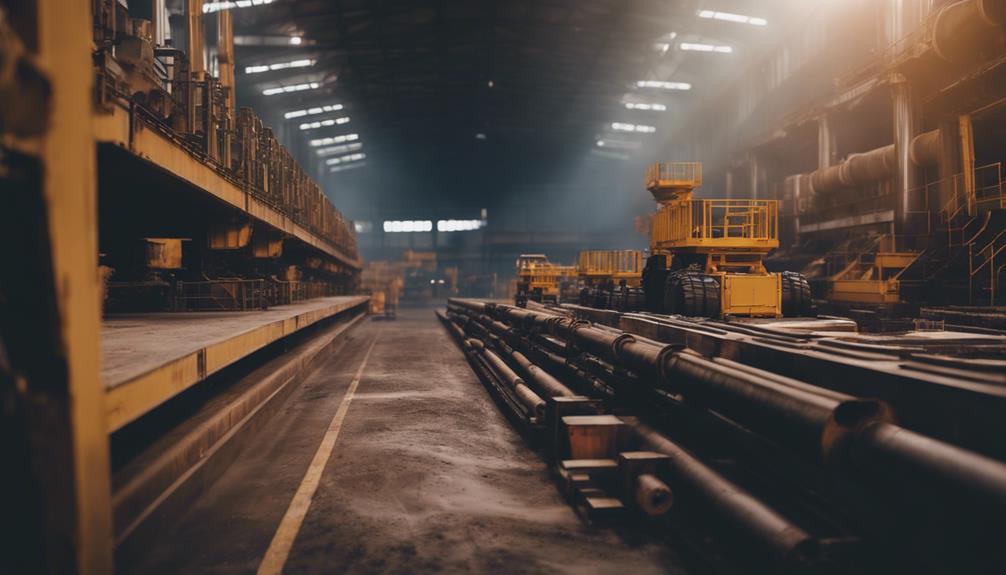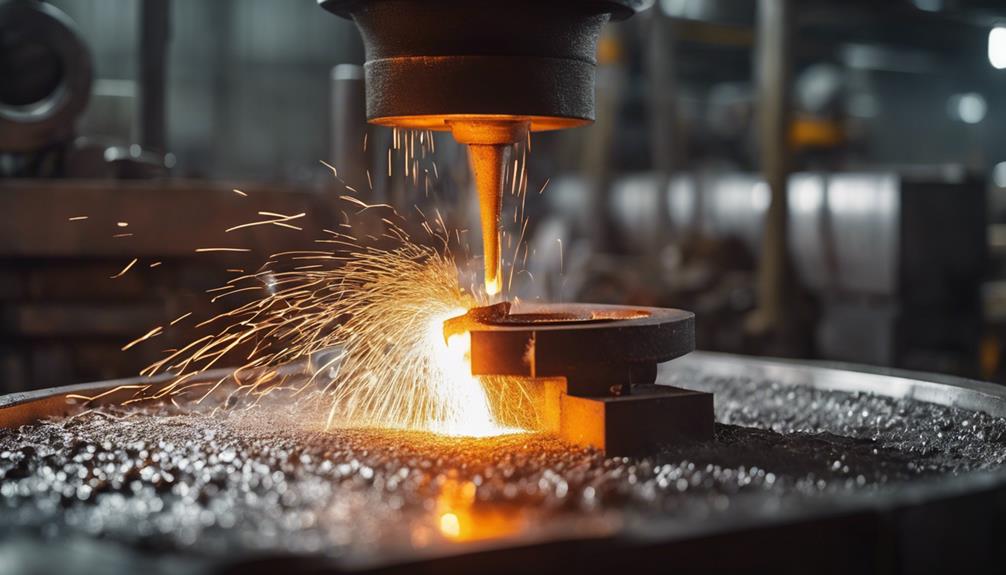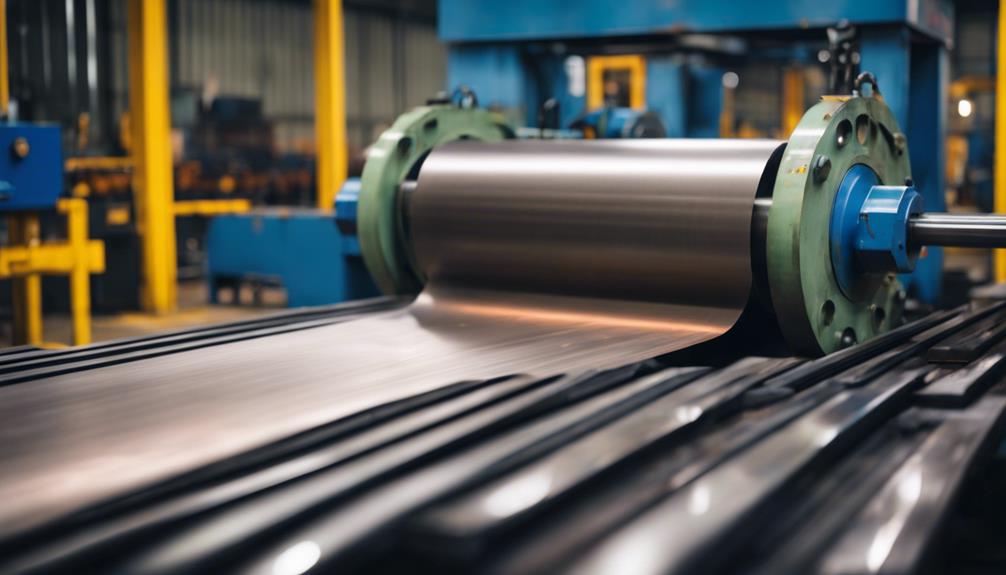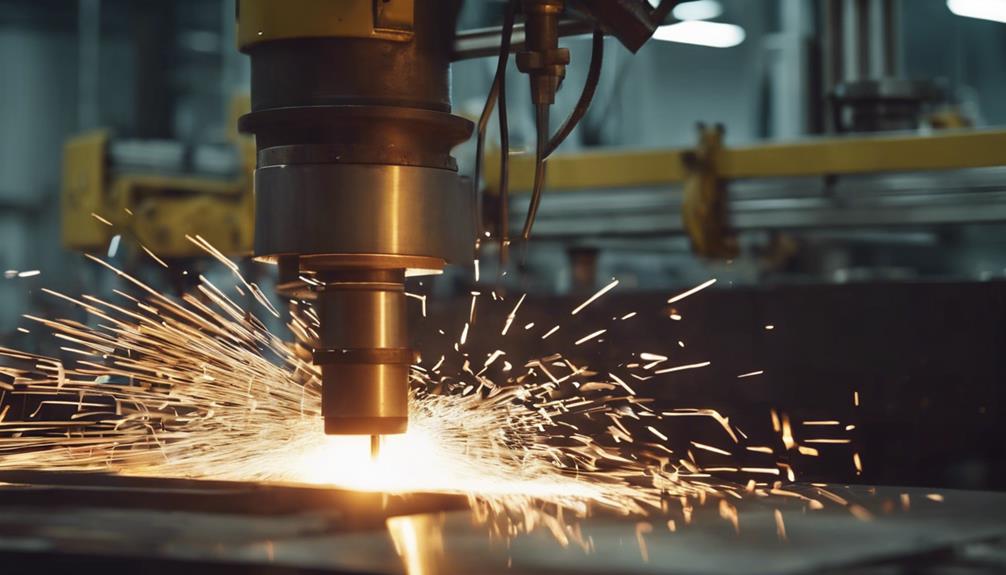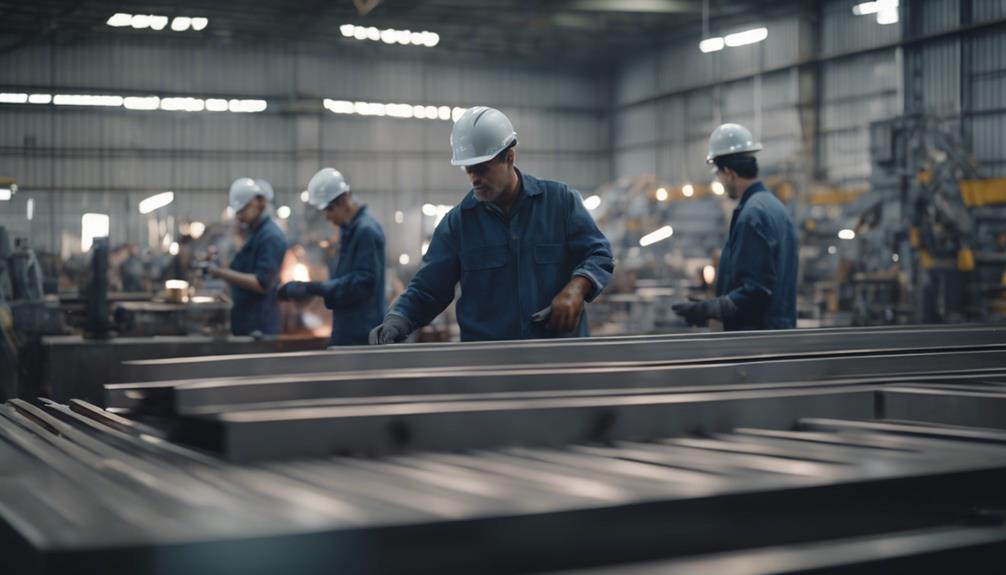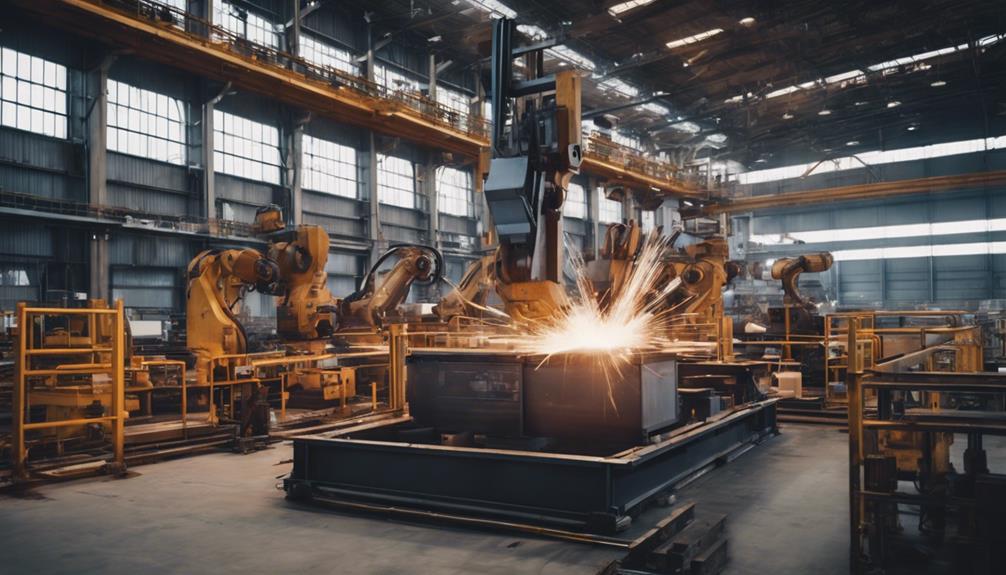
by Abdullah | May 17, 2024 | Steel Fabrication
Industrial steel fabrication revolutionizes the manufacturing industry with robotics and advanced technologies enhancing efficiency and precision. Automated stations optimize production, reduce human errors, and enhance productivity. Additive manufacturing enables intricate designs and customization, reducing material waste. Advanced materials elevate product performance and durability. Green practices minimize environmental impact, while digital integration leads to smarter operations with IoT and AI. This transformation in steel fabrication drives innovation, sustainability, and competitiveness in the manufacturing industry. Discover more about the cutting-edge advancements shaping the future of industrial steel fabrication.
Key Takeaways
- Robotics streamline steel fabrication processes, enhancing efficiency and precision.
- Additive manufacturing enables complex designs and reduces material waste.
- Advanced materials improve product performance and sustainability.
- Green practices in steel manufacturing promote eco-friendly methods.
- Digital integration with IoT and AI optimizes operations for increased competitiveness.
Automation in Steel Fabrication
Automation has revolutionized the steel fabrication industry by integrating robotics and advanced technologies to enhance efficiency and precision in production processes. Robotics play an essential role in steel fabrication, improving productivity and precision while reducing the occurrence of human errors in tasks such as welding, cutting, and assembling. Automated stations, including bending machines, are instrumental in optimizing production by minimizing downtime, enhancing accuracy, and increasing adaptability to different production requirements.
Moreover, the utilization of AI-guided lasers in steel fabrication has proven to be beneficial. These lasers help in reducing gas consumption, enhancing productivity levels, and contributing immensely to the overall efficiency of the manufacturing processes. The integration of smart processes in automated stations further enhances efficiency, accuracy, and safety in steel fabrication. As a result, these advancements in automation technologies are driving significant progress in the steel fabrication industry, leading to improved production processes and higher quality outputs.
Robotics and Efficiency Boost
The integration of robotics into industrial steel fabrication processes not only enhances efficiency but also drives substantial improvements in productivity and quality within the manufacturing sector.
By automating tasks such as welding, cutting, and assembling, robotics play an essential role in streamlining operations in steel fabrication. Automated processes greatly reduce production time and labor costs while ensuring precision and consistency in fabricating even the most complex steel components.
This, in turn, leads to higher productivity rates and an overall enhancement in the quality of manufactured goods. The efficiency boost brought about by robotics in steel fabrication results in increased output capacity, providing companies with a competitive edge in the industry.
As robotics continue to advance and become more sophisticated, the manufacturing sector can expect further optimization of processes, ultimately revolutionizing the way industrial steel fabrication is approached.
Additive Manufacturing Innovations
Additive manufacturing advancements in the steel fabrication industry have revolutionized the production of intricate metal components through layer-by-layer construction. Also known as 3D printing, this technology enables the creation of complex designs that were previously unattainable with traditional fabrication methods.
By utilizing additive manufacturing for metal components, manufacturers benefit from increased design flexibility and customization options. This innovative approach is particularly important for producing prototypes, tooling, and unique parts, as it reduces material waste compared to subtractive manufacturing processes.
The application of 3D printing in steel fabrication drives innovation within the sector, allowing for the development of highly detailed and customized metal products. These advancements not only enhance efficiency and speed up production but also enable the creation of intricate metal structures with unparalleled precision.
As additive manufacturing continues to evolve, it plays a significant role in shaping the future of steel fabrication processes.
Advanced Materials in Fabrication
Utilizing advanced materials in steel fabrication processes elevates product performance and durability, setting new standards for the manufacturing industry.
Industrial metal fabrication has seen a significant shift towards incorporating advanced materials such as high-strength alloys and composites. These materials offer superior corrosion resistance, increased durability, and enhanced design flexibility for innovative solutions.
By employing advanced materials in the steel fabrication process, manufacturers can guarantee longer product lifespans and create components that are both stronger and lighter. This not only reduces fuel consumption but also enhances product durability, making them ideal for various applications.
The reliable strength-to-weight ratios of these advanced materials further contribute to the efficiency, performance, and sustainability of industrial metal fabrication.
Green Practices in Steel Manufacturing
With a growing emphasis on sustainability and environmental consciousness, the steel manufacturing industry is increasingly shifting towards implementing green practices to reduce its carbon footprint and promote eco-friendly production methods.
Green practices in steel manufacturing focus on minimizing environmental impact by incorporating recycled materials and energy-efficient processes. Initiatives in steel fabrication that prioritize eco-friendliness are propelling innovation within the industry towards more sustainable practices.
Minimizing waste through precise fabrication techniques stands as a central objective in green steel manufacturing, aligning with global efforts to reduce carbon footprint and promote eco-conscious production methods. Sustainability in steel fabrication is not only an environmental necessity but also a strategic business approach to meet evolving consumer demands.
Digital Integration for Smarter Operations
Digital integration technologies such as IoT, AI, and machine learning are revolutionizing Industrial Steel Fabrication, leading to smarter and more efficient operations. By leveraging these advanced technologies, smart fabrication facilities can tap into real-time data for predictive maintenance and quality control purposes.
The integration of IoT and AI enables steel manufacturers to optimize their production processes, ensuring heightened efficiency and precision in every step of fabrication. These digital tools also contribute to making operations leaner and more responsive, ultimately enhancing the overall productivity and competitiveness of the manufacturing industry.
In a sector where precision and timeliness are paramount, the implementation of digital integration stands out as an essential factor in staying ahead. As technology continues to advance, the seamless integration of digital tools will likely become the norm rather than the exception in the domain of industrial steel fabrication.
Frequently Asked Questions
What Is the Future of the Metal Fabrication Industry?
The future of the metal fabrication industry is evolving through technology, sustainability, and innovation, with a focus on automation, advanced materials, and digital tools. These advancements enhance efficiency, durability, and environmental responsibility, shaping a dynamic and progressive industry landscape.
How Is Fabrication Related to Manufacturing?
Fabrication in manufacturing involves processes like cutting, bending, and assembling raw materials to create finished products or components. It guarantees precision and accuracy, meeting specific design requirements through stages such as design, cutting, forming, assembly, and finishing.
Is Steel Fabrication Considered Manufacturing?
Certainly, steel fabrication is unquestionably considered a pivotal aspect of the manufacturing industry. It involves the intricate process of transforming raw steel materials into finished goods through cutting, bending, and assembling, showcasing its significance in production processes.
How Is AI Changing the Metal Fabrication Industry?
Artificial Intelligence is revolutionizing the metal fabrication industry by enabling predictive maintenance, automating processes with machine learning algorithms, utilizing AI-guided lasers for efficiency, integrating robotics for productivity, and ensuring high-quality products through advanced technologies.
Conclusion
Overall, the industrial steel fabrication industry is experiencing a significant revolution through the implementation of automation, robotics, additive manufacturing, advanced materials, green practices, and digital integration.
These advancements are leading to increased efficiency, precision, and sustainability in manufacturing processes.
As technology continues to evolve, the future of steel fabrication looks promising with continued innovations driving the industry forward.
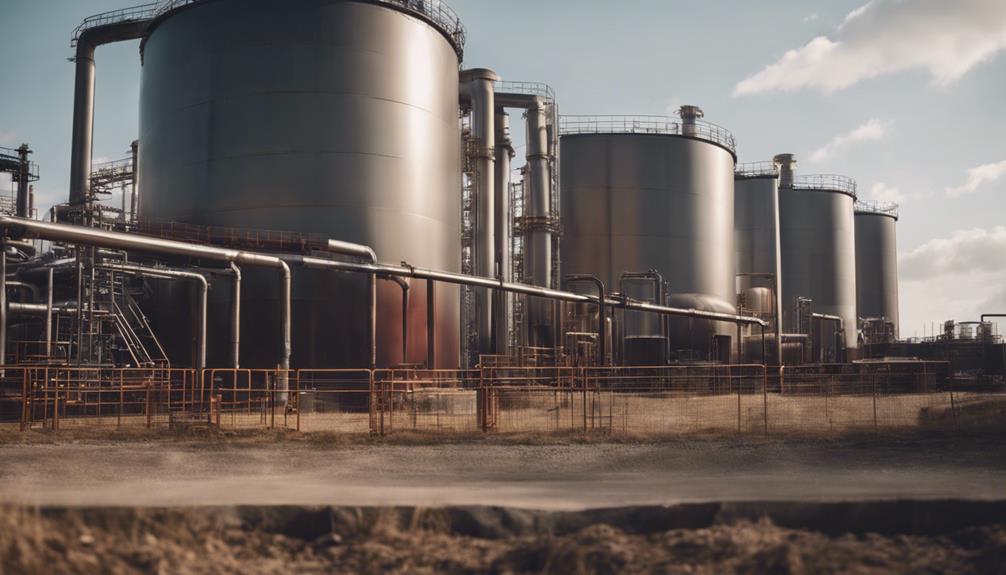
by Abdullah | May 17, 2024 | Steel Fabrication, Steel Products, Storage Tanks
Steel storage tanks excel in industrial storage for their unmatched durability, corrosion resistance, and ability to withstand harsh conditions. They offer versatility across various sectors by safely storing water, chemicals, grains, oil, and gas. With minimal maintenance needs and a long lifespan, steel tanks are a cost-effective solution with a high return on investment. These eco-friendly tanks meet industry regulations, ensuring safe storage of materials. Their reliability and compliance make them the preferred choice. Explore further to discover the extensive benefits steel storage tanks provide for industrial storage.
Key Takeaways
- Steel tanks offer unmatched durability and longevity.
- Highly resistant to corrosion, ensuring long-term performance.
- Superior performance in harsh environments, maintaining water safety.
- Versatile for various industrial needs like storing water, chemicals, and oil.
- Cost-effective with a high return on investment and minimal maintenance requirements.
Durability and Longevity
Steel’s renowned resilience and resistance to corrosion make it an ideal material for guaranteeing the longevity and durability of industrial storage tanks. When it comes to storing various liquids or gases, steel storage tanks, including stainless steel storage tanks, stand out for their exceptional durability. These tanks are specifically designed and constructed to withstand the test of time, providing a reliable and long-lasting storage solution for industrial applications. The durability of steel storage tanks guarantees that they can endure harsh conditions, maintain structural integrity, and resist corrosion, making them a superior choice for long-term storage needs in industrial settings.
Investing in steel storage tanks guarantees not only exceptional durability but also longevity, offering a sound and reliable storage solution for businesses. Prefabricated steel tanks, known for their strength and corrosion resistance, are a wise investment for industries looking for a dependable storage option that can withstand the rigors of continuous use. Overall, the durability of steel storage tanks makes them a preferred choice for meeting industrial storage requirements efficiently and effectively.
Resistance to Corrosion
With its exceptional resistance to corrosion, stainless steel storage tanks offer unmatched durability and reliability for industrial storage applications. Stainless steel tanks are highly resistant to corrosion, ensuring long-term performance and minimal maintenance costs.
Unlike other materials, stainless steel does not rust or corrode, making it a superior choice for storing various liquids, including water. The corrosion-resistant nature of stainless steel helps prevent degradation, maintaining water quality over time and reducing the risk of contamination.
This resistance to corrosion is a key factor in why steel water tanks are preferred for industrial storage needs, guaranteeing a safe and reliable storage solution.
While the initial stainless steel tank price may be higher than other options, the long-term cost-effectiveness and durability make stainless steel tanks a wise investment for industrial applications, where performance and reliability are paramount.
Superior Performance in Harsh Conditions
Stainless steel storage tanks demonstrate exceptional durability and resilience in harsh conditions, ensuring reliable performance and protection for industrial storage requirements. Their ability to excel in challenging environments sets them apart from traditional tanks made of plastic or concrete.
Steel storage tanks offer unparalleled longevity, outlasting other materials and maintaining water safety and quality over time. The superior performance of steel tanks in harsh conditions makes them a wise long-term investment for industrial applications where reliability is paramount. These tanks provide secure protection for stored materials, ensuring excellent performance in demanding settings.
With their resistance to corrosion and degradation, steel storage tanks stand as a robust solution for industrial storage needs, offering a combination of strength and durability that is essential for safeguarding valuable resources and maintaining operational efficiency in the face of harsh conditions.
Versatility in Industrial Applications
Demonstrating guarantee across diverse industrial sectors, steel storage tanks serve as versatile solutions for a wide array of storage requirements. These tanks are utilized for various industrial applications, from storing drinking water and rainwater to chemicals, grains, and oil and gas.
Their ability to withstand extreme temperatures and compatibility with different water treatment methods make them suitable for a broad range of storage needs. The robust construction of steel tanks guarantees reliable water storage in diverse industrial contexts while upholding quality and safety standards.
Additionally, the customization options available with steel tanks enable tailoring to specific industrial requirements, making them a highly flexible solution for different storage needs. Overall, steel tanks provide a cost-effective and durable storage solution for industrial applications, offering long-term reliability and performance across a multitude of industries.
Cost-Effectiveness and ROI
Steel storage tanks demonstrate exceptional cost-effectiveness and a high return on investment due to their long lifespan and minimal maintenance requirements. The initial investment in a steel tank is offset by its durability, which greatly reduces the need for frequent repairs or replacements. This reliability guarantees that the long-term cost of ownership is lower compared to other storage tank materials.
Steel tanks offer a superior cost-to-benefit ratio over time, making them a financially sound choice for industrial storage needs. Additionally, the resistance of steel tanks to corrosion and wear further enhances their return on investment by reducing operational costs associated with maintenance and potential leaks.
Eco-Friendly and Sustainable Solution
An environmentally conscious choice for industrial storage solutions, steel tanks offer a sustainable and eco-friendly option for businesses aiming to reduce their carbon footprint and uphold responsible practices.
Stainless steel, a primary material used in these tanks, is highly sustainable and recyclable, greatly minimizing environmental impact compared to plastics.
The recyclability of steel tanks is remarkable, as they can be recycled indefinitely without any loss in quality, making a positive contribution to environmental preservation efforts.
Easy Maintenance and Long-Term Reliability
Ensuring operational efficiency and durability, steel storage tanks boast minimal maintenance requirements and long-term reliability in industrial settings. Their durable and corrosion-resistant nature reduces the need for frequent upkeep, making them a cost-effective choice for storage solutions.
Steel tanks are known for their long-term reliability, providing consistent performance over many years without compromising quality. Not only do they offer reliability, but they also help save on operational expenses due to their lower maintenance costs compared to tanks made from other materials.
The robust construction of steel tanks greatly decreases the risk of leaks or failures, ensuring the safety of stored materials. This easy upkeep and dependable performance make steel storage tanks a preferred choice for various industrial storage needs where reliability and low maintenance are key considerations.
Compliance With Industry Regulations
In alignment with stringent industry standards, steel storage tanks demonstrate adherence to regulatory requirements for the safe containment and handling of various materials.
These tanks comply with industry regulations, such as API standards, guaranteeing the safe storage of petroleum products and meeting specific criteria for environmental protection, fire safety, and structural integrity.
By complying with regulations, steel tanks are designed to prevent leaks, spills, and contamination, thereby meeting strict industry standards and minimizing risks associated with hazardous materials.
The adherence to these regulations not only ensures operational safety but also plays a significant role in protecting the environment from potential harm.
Compliance with industry regulations is integral to the safe handling, storage, and transportation of materials, highlighting steel storage tanks as a reliable and secure solution for industrial storage needs.
Frequently Asked Questions
What Are the Benefits of Steel Tanks?
Steel tanks provide durability, water purity, hygiene, eco-friendliness, and versatility. Their resistance to corrosion, rust, and degradation guarantees long-term reliability. With a smooth surface, they are easy to clean and maintain, thereby preventing bacterial growth.
Why Steel Tanks Are Used for Storage of Hot Water?
Steel tanks are chosen for storing hot water due to their durability, resistance to corrosion, and non-reactive nature. They maintain water purity, do not leach harmful chemicals, are easy to clean, and guarantee a continuous, safe supply.
Which Is Better Plastic Tank or Steel Tank?
When comparing plastic tanks to steel tanks, steel tanks surpass in durability, purity, hygiene, sustainability, and versatility. Steel tanks resist corrosion, do not leach chemicals, are easy to clean, recyclable, and provide reliable water storage solutions for various applications.
What Are Industrial Storage Tanks Used For?
Industrial storage tanks are vital for safely storing substances like water, chemicals, oils, and grains in various industries such as agriculture, manufacturing, oil and gas, and water treatment facilities. They guarantee a reliable supply of essential materials for industrial processes.
Conclusion
To sum up, steel storage tanks offer superior durability, resistance to corrosion, and performance in harsh conditions, making them the best solution for industrial storage needs.
Their versatility, cost-effectiveness, and eco-friendly nature further enhance their appeal in various industrial applications.
With easy maintenance and long-term reliability, Steel Storage Tanks also guarantee compliance with industry regulations, providing a sustainable and reliable storage solution for businesses.
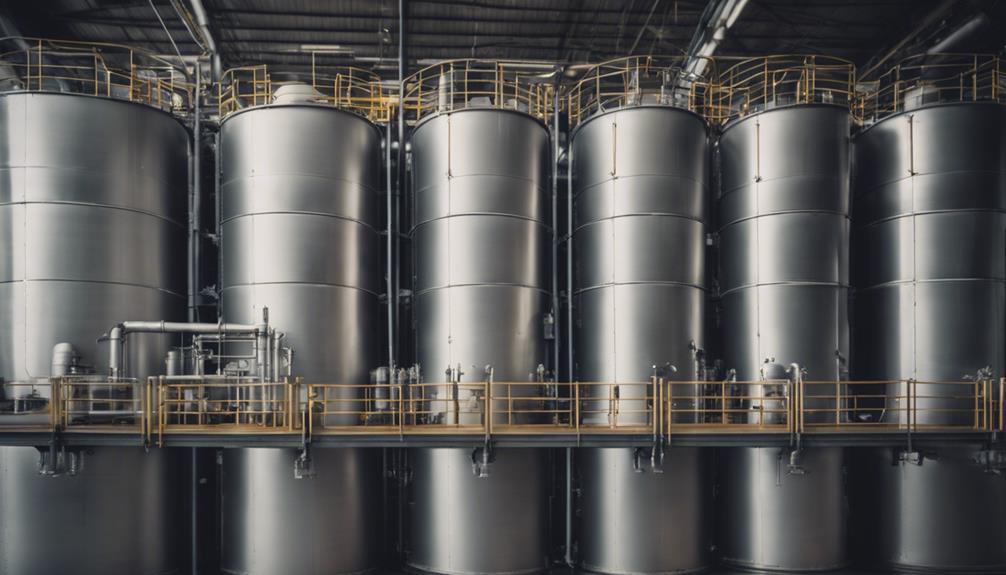
by Abdullah | May 13, 2024 | Steel Fabrication
Bulk storage silos are essential for businesses aiming to enhance efficiency and save costs. They maximize storage capacity, protect materials, and streamline production. By optimizing storage, enhancing operational efficiency, and centralizing storage, silos improve workflow and reduce transportation expenses. They also facilitate efficient inventory management, secure storage, and enhanced material handling processes. Overall, silos play a pivotal role in enhancing material handling efficiency, reducing maintenance costs, and maximizing space utilization. Their impact on logistics is significant, revolutionizing supply chain efficiency and streamlining operations effectively. Explore how these silos can transform your business operations for maximum efficiency and cost savings.
Key Takeaways
- Bulk storage silos optimize storage efficiency and operational processes.
- Cost savings achieved through reduced maintenance and logistics expenses.
- Centralized storage minimizes transportation costs and streamlines workflows.
- Secure, organized storage prevents cross-contamination and enhances safety.
- Implementing FIFO principle ensures efficient inventory management.
Benefits of Bulk Storage Silos
Efficiency and cost savings are key advantages associated with the utilization of bulk storage silos in industrial settings. Concrete mixer silos, a specific type of silo commonly used in construction projects, offer numerous benefits. These silos maximize storage capacity efficiently by utilizing vertical space, reducing the need for additional land or infrastructure. By protecting materials from external factors, such as moisture or contamination, concrete mixer silos preserve the quality and value of the stored materials. The dedicated compartments in these silos prevent cross-contamination, ensuring the purity and integrity of the materials used in the construction process.
Moreover, concrete mixer silos streamline production processes by centralizing storage, improving workflow efficiency, and enabling automated material handling systems. The proximity of these silos to construction sites reduces transportation costs, optimizes supply chain efficiency, and enhances inventory control and traceability. Overall, the use of concrete mixer silos in construction projects leads to increased efficiency, cost savings, and improved material preservation.
Silo Impact on Material Handling
The utilization of bulk storage silos, particularly concrete silos in construction projects, has a profound impact on material handling processes by optimizing storage and enhancing operational efficiency. Concrete silo construction centralizes storage, streamlining retrieval processes, and protecting materials from external factors, reducing waste and preserving quality.
Efficient loading and unloading facilitated by these silos enhance workflow and productivity on construction sites. Additionally, segregation within concrete silos prevents cross-contamination, ensuring the purity and integrity of stored materials.
The proximity of these silos to production facilities minimizes transportation costs, optimizing supply chain efficiency for construction projects. By incorporating concrete silos into material handling processes, construction companies can effectively manage their resources, reduce material wastage, and improve overall operational efficiency.
These factors highlight the significant impact that concrete silos have on material handling within the construction industry.
Operational Efficiency Through Silos
Maximizing operational productivity, bulk storage silos serve as key components in enhancing material handling efficiency within construction projects. Specifically, in concrete mixing operations, silos play a pivotal role in optimizing storage space and streamlining material transfer processes. By utilizing vertical storage, concrete mixing silos efficiently store raw materials, additives, and aggregates, allowing for easy access and retrieval during construction activities.
Moreover, the implementation of the FIFO (First In, First Out) principle in concrete mixing silos guarantees efficient inventory management, reducing the risk of material spoilage and waste. This systematic approach not only enhances operational efficiency but also contributes to cost savings by minimizing unnecessary inventory holding costs.
Furthermore, concrete mixing silos offer secure and organized storage solutions, eliminating the need for additional storage space and reducing operational costs. By incorporating robust safety features and monitoring systems, such as level sensors and pressure indicators, concrete mixing silos ensure stability and integrity in material handling processes, safeguarding both the materials and the construction site.
Cost Savings With Bulk Storage
In the domain of construction projects, the strategic utilization of bulk storage silos not only enhances operational productivity but also contributes greatly to substantial cost savings. Businesses investing in ready mix concrete silos benefit from reduced maintenance expenses and minimized material wastage, leading to significant cost savings.
The efficient storage solutions offered by silos optimize material handling processes, thereby reducing operational inefficiencies and cutting down on maintenance costs. By storing materials near production facilities, bulk storage silos also help in lowering transportation expenses by eliminating the need for frequent material transport.
These cost-effective storage solutions maximize space utilization, which in turn reduces storage costs and boosts operational efficiency. Overall, implementing bulk storage silos results in substantial cost savings by streamlining logistics, enhancing efficiency, and reducing production times.
Enhancing Logistics With Silos
Enhancing logistical operations through the strategic integration of bulk storage silos revolutionizes supply chain efficiency and material handling processes in various industries.
Bulk storage silos play a pivotal role in enhancing logistics by reducing transportation costs through the proximity of bulk materials to production facilities, minimizing the need for long-distance hauling. This strategic placement near production lines optimizes supply chain efficiency, leading to cost savings and operational improvements.
Additionally, silos streamline logistics by providing centralized storage, which enhances material handling processes and reduces production times. The efficient loading and unloading capabilities of silos further improve workflow, supporting operational efficiency and inventory control.
In industries with seasonal fluctuations in supply and demand, such as agriculture, silos help manage these variations effectively. This contributes to enhanced traceability and helps mitigate supply chain disruptions, making bulk storage silos a valuable asset in enhancing overall logistics operations.
Frequently Asked Questions
What Are the Benefits of Silos?
Silos offer numerous advantages, including maximizing storage capacity, protecting materials, preventing cross-contamination, streamlining production processes, and optimizing supply chain efficiency. These benefits enhance operational efficiency, quality control, and cost-effectiveness in various industries.
Why Are Storage Silos Important?
Storage silos are essential for industries as they safeguard materials, enhance inventory management, and streamline material handling processes. They protect products, reduce waste, and optimize storage space, contributing to operational efficiency and cost savings.
What Are Silos Used for Storing?
Silos are used for storing bulk materials such as grains, cement, coal, and food products. These storage structures offer a secure and organized way to hold large quantities of materials, ensuring easy access and preventing spoilage and waste.
What Can Be Stored in Silos?
Silos offer versatile storage solutions for a wide array of bulk materials, ranging from grains, cement, and chemicals to liquids like water and oil. They cater to various industries by accommodating materials such as plastic pellets, wood chips, and hazardous substances.
Conclusion
To sum up, bulk storage silos offer numerous benefits such as increased operational efficiency, cost savings, and improved logistics.
By utilizing silos for material storage, businesses can streamline their operations, reduce waste, and optimize their supply chain processes.
Overall, incorporating Bulk Storage Silos into a facility’s infrastructure can lead to significant improvements in efficiency and cost-effectiveness.

by Abdullah | May 13, 2024 | Steel Fabrication
Industrial steel structures provide exceptional strength with high compressive and tensile strength, a favorable strength-to-weight ratio, and excellent ductility. They possess outstanding resilience, stability, and resistance to expansion. Durability is guaranteed through resistance to corrosion, structural stability, and minimal repair needs. Steel structures excel in impact resistance while maintaining robust structural integrity, making them reliable for heavy loads. Their longevity exceeds 50 years, with design flexibility and sustainability. Fire and corrosion protection are enhanced with inherent resistance to high temperatures and barrier coatings. Steel’s inorganic composition naturally resists pests, eliminating the need for additional treatments. Discover more about steel’s unmatched attributes.
Key Takeaways
- Steel offers exceptional strength and resilience for industrial structures.
- Durability is ensured through corrosion resistance and high-quality materials.
- Structural integrity is maintained with impact resistance and stability.
- Steel buildings have a lifespan of over 50 years, promoting sustainability.
- Fire and corrosion protection, along with pest resistance, enhance longevity.
Steel Strength Attributes
Steel’s exceptional strength characteristics play a pivotal role in the performance and reliability of industrial steel structures. When it comes to building construction, the steel strength attributes are crucial. Industrial steel structures require materials that can withstand heavy loads and structural movements, which is where steel excels. The high compressive and tensile strength of steel make it an ideal choice for such applications. Additionally, the high strength-to-weight ratio of steel ensures that these structures can bear significant loads without adding unnecessary weight.
Structural steel for building construction must possess excellent ductility to allow for bending without breaking under extreme conditions. This attribute is important in ensuring the safety and longevity of industrial steel structures. Furthermore, steel’s stability and resistance to expansion and contraction further contribute to the long-term structural integrity of these buildings. The predictability of steel in maintaining its basic properties and chemical composition under stress also makes it a preferred material for Industrial Steel Structures, providing reliability and peace of mind to builders and occupants alike.
Resilience in Steel Structures
The exceptional resilience demonstrated by steel structures is a proof of their capability to withstand extreme conditions and natural disasters, making them a reliable choice for industrial and commercial building projects.
Industrial steel structure suppliers recognize the importance of resilience in steel buildings, offering designs that prioritize safety and longevity. Stainless steel structure building further enhances resilience by providing corrosion resistance, guaranteeing durability in various environments.
Despite their strength, steel building prices remain competitive due to efficient manufacturing processes and the material’s recyclability, making them a cost-effective choice for resilient structures.
The ability of steel structures to bend without breaking, thanks to their flexibility and ductility, ensures they can withstand high-stress situations and recover their original shape, maintaining structural integrity over time. This resilience not only guarantees the safety of occupants but also contributes to the long-term performance and sustainability of industrial steel buildings.
Durability Factors of Industrial Steel
Engineered with cutting-edge technology and high-quality materials, industrial steel structures boast exceptional durability factors that guarantee longevity and reliability in challenging environments. These structures are specifically designed to resist corrosion, ensuring they maintain their integrity and strength over the long term, even in harsh conditions.
The steel used in industrial construction undergoes extensive testing to meet stringent durability and strength standards, ensuring it can withstand heavy loads and extreme weather conditions without compromising its structural stability. Additionally, surface treatments like galvanizing provide an extra layer of protection against rust and corrosion, further enhancing the durability of industrial steel structures.
Impact Resistance of Steel
Exhibiting exceptional resistance to impact forces, industrial steel structures are renowned for their ability to withstand heavy impacts in environments prone to dynamic loads. Steel’s high impact resistance stems from its inherent strength and ductility, allowing it to absorb and distribute impact energy efficiently. This quality reduces the risk of structural damage, making steel structures suitable for areas where machinery, vehicles, or equipment may exert significant forces.
The design of industrial steel structures takes into account the need to withstand impact without compromising structural integrity. By offering enhanced safety for occupants and equipment within industrial facilities, impact-resistant steel structures guarantee a secure environment. Additionally, steel’s resilience to impact not only ensures the safety of individuals and assets but also contributes to the long-term durability of the structure, requiring minimal maintenance over time. Overall, the impact resistance of steel plays an essential role in maintaining the structural stability and safety of industrial facilities.
Structural Integrity of Steel
Guaranteeing robust structural integrity, steel remains a stalwart choice for withstanding extreme conditions and heavy loads in industrial settings. Steel structures exhibit remarkable resilience, maintaining their integrity even when subjected to severe forces such as earthquakes and hurricanes.
This resilience is attributed to steel’s high strength-to-weight ratio, which provides structural stability and durability over time. Additionally, steel’s inherent resistance to corrosion and rust further enhances its long-term structural integrity, making it a reliable choice for industrial applications where longevity is paramount.
Engineers employ advanced techniques and stringent quality control measures during the design and construction of steel structures to secure their ability to withstand heavy loads and forces, thereby safeguarding their structural stability in demanding industrial environments. The continuous emphasis on structural integrity in the use of steel underscores its reputation as a durable and dependable material for industrial construction projects.
Longevity of Steel Buildings
Steel buildings showcase exceptional longevity, standing as enduring evidence to the durability and structural integrity of steel in industrial applications. With a lifespan of over 50 years, steel structures guarantee long-term durability and robustness. Proper maintenance practices can even extend this lifespan to well over a century, highlighting the resilience of steel in construction.
One key factor contributing to the longevity of steel buildings is their resistance to corrosion and rust, which minimizes the need for frequent repairs and upkeep. Additionally, the design flexibility of steel structures allows for easy upgrades and modifications over time, further enhancing their longevity in industrial settings.
Despite the passage of time, steel buildings maintain both their aesthetic appeal and structural strength, making them a reliable choice for long-term industrial use. The ability of steel structures to withstand the test of time underscores their practicality and sustainability in the construction industry.
Sustainable Steel Construction
In the domain of industrial construction, the focus on sustainability has propelled the adoption of innovative practices, particularly in the efficient utilization of steel for structural projects. Sustainable steel construction embraces the principles of reducing waste through the use of recycled steel materials in industrial structures. This approach allows for the disassembly and reuse of steel structures, promoting a circular economy within the construction industry.
Steel’s exceptional recyclability rate of up to 90% further solidifies its position as a highly sustainable choice for industrial building projects. The energy-efficient nature of steel structures not only enhances their durability but also contributes significantly to reducing carbon emissions during both the construction and operation phases.
In addition, sustainable steel construction practices align seamlessly with green building standards such as LEED, emphasizing environmental stewardship and responsible resource management in industrial projects. By incorporating these sustainable practices, industrial steel structures can not only withstand the test of time but also contribute positively to the environment.
Steel’s Fire Resistance
The remarkable ability of steel structures to withstand high temperatures is a critical aspect of their design, particularly in ensuring occupant safety in industrial buildings. Steel’s inherent fire resistance lies in its capability to maintain structural integrity even in extreme heat conditions. This property is essential for preventing structural collapse during a fire, safeguarding lives and minimizing property damage.
Steel’s high melting point and low thermal expansion further enhance its fire-resistant properties, allowing it to perform reliably under intense heat exposure. The fire resistance of steel structures is paramount in meeting safety standards and regulations for industrial buildings. Designing with steel offers a distinct advantage in fire-prone environments, as it provides a robust and dependable solution for protecting occupants and assets.
Engineers and architects prioritize steel’s fire resistance when planning industrial structures, acknowledging its pivotal role in ensuring the overall safety and longevity of the building. By leveraging steel’s exceptional performance under fire conditions, industrial facilities can better mitigate risks and enhance their resilience to potential disasters.
Corrosion Protection in Steel
Corrosion protection is a critical consideration in enhancing the longevity and performance of industrial steel structures. To combat corrosion, various methods are employed, with barrier coatings like paint being a common choice to isolate the steel from water and oxygen.
Zinc coatings, such as galvanized steel, are particularly effective as they provide sacrificial and barrier protection against corrosion in industrial settings. Properly designed steel structures undergo rigorous laboratory and field exposure tests to guarantee they offer excellent service life and corrosion resistance.
Building codes also mandate that steel structures must either tolerate corrosion or be adequately shielded against it to secure long-term durability in industrial applications. Implementing corrosion protection measures not only helps maintain the structural integrity of steel structures but also prevents degradation caused by environmental elements, ultimately prolonging their lifespan and enhancing their overall performance.
Pest Resistance in Steel Structures
Steel structures present a formidable barrier against pests like termites, thanks to their inherent inorganic composition. This natural resistance is a significant advantage in industrial construction, as it eliminates the risk of structural damage caused by pests.
Steel framing, commonly used in industrial structures, meets termite-resistant construction requirements, ensuring long-term durability. Unlike wood, steel construction does not require costly annual termite treatments, saving on maintenance expenses over time. The inorganic nature of steel makes it a reliable choice for pest-resistant industrial buildings, providing peace of mind to property owners.
Cold-formed steel, specifically designed for industrial applications, offers an additional layer of protection against pest infestations. Overall, the pest resistance of steel structures contributes to their strength and longevity, making them a practical and cost-effective solution for industrial construction projects.
Frequently Asked Questions
What Is the Durability of Steel Structures?
The durability of steel structures lies in their exceptional resistance to corrosion, rust, and deterioration, ensuring longevity and reliability. Steel’s ability to withstand harsh conditions, including extreme weather and seismic events, highlights its exceptional durability.
What Are the Strengths of Structural Steel?
Structural steel boasts a high strength-to-weight ratio, making it a preferred choice for tall buildings and industrial structures. Its exceptional strength, resistance to fire and weather damage, and ability to withstand natural disasters highlight its reliability and longevity.
How Durable Are Steel Buildings?
Steel buildings demonstrate exceptional durability, highlighting resilience against various environmental factors, including corrosion, fire, pests, and extreme weather conditions. Their robust nature guarantees long-term structural integrity, minimal maintenance needs, and extended lifespan.
What Is the Durability of Metal?
Metal, particularly steel, is highly durable, showcasing resistance to corrosion, rust, and degradation over time. Its structural integrity and longevity make it a reliable choice for various applications, providing cost-effectiveness and sustainability through its ability to withstand wear and tear.
Conclusion
To summarize, industrial steel structures possess exceptional strength, resilience, and durability due to their inherent attributes.
Steel’s high impact resistance, structural integrity, fire resistance, corrosion protection, and pest resistance make it a sustainable choice for construction projects.
The combination of these factors guarantees that steel structures can withstand various environmental challenges and maintain their structural integrity over time, making them a reliable and long-lasting option for industrial applications.
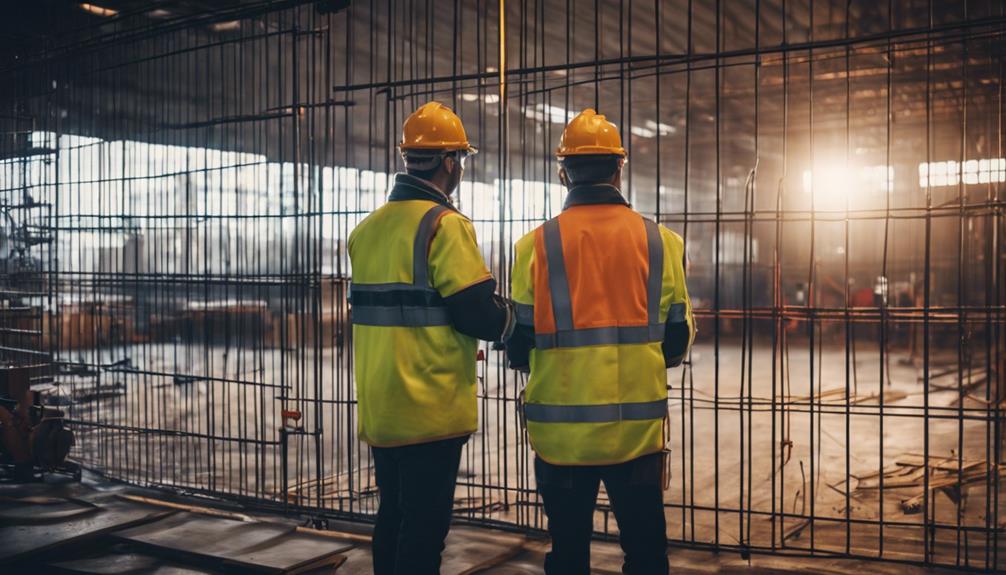
by Abdullah | May 8, 2024 | Steel Fabrication
When constructing a warehouse, ensuring regulatory compliance, implementing advanced security systems, providing thorough safety training, and formulating emergency response plans are essential for a secure environment. Prioritize safety in the planning stages, protect assets through strategic measures, and plan for long-term security sustainability. Incorporate safety measures like proper lighting, clear signage, and routine inspections. Establish security protocols with access control systems, surveillance, and alarm systems. Address fire prevention with suppression systems and regular drills. Manage inventory efficiently with tracking systems. Monitor the structural integrity to adhere to building codes. These considerations lay the foundation for a safe and secure warehouse.
Key Takeaways
- Compliance with zoning regulations and building codes is crucial for safe warehouse construction.
- Implement advanced security systems like CCTV cameras and access control technologies.
- Prioritize safety protocols and training programs for a secure warehouse environment.
- Develop emergency response plans for unforeseen events and personnel safety.
- Incorporate long-term security planning with regular audits and advanced security measures.
Regulatory Compliance and Safety Standards
Ensuring regulatory compliance and adherence to safety standards are fundamental pillars in the planning and execution of warehouse construction projects. Obtaining permits for Warehouse Construction is not just a bureaucratic task; it is essential for meeting legal requirements and ensuring project timelines are adhered to. Compliance with zoning regulations and building codes is necessary to guarantee warehouse safety throughout its lifecycle.
Warehouse construction processes are heavily influenced by safety considerations such as fire safety and environmental regulations. From the project’s inception, understanding and adhering to regulatory standards are essential to guarantee safe warehouse construction. This includes meeting safety standards for hazardous materials handling, which is crucial for creating a secure warehouse environment.
Security Systems and Access Control
Implementing robust security systems, including CCTV cameras and access control technologies, is essential for guaranteeing the protection and control of warehouse entry points in steel warehouse construction. Access control technology, such as keycards or biometric systems, plays a vital role in enhancing security by restricting unauthorized access to sensitive areas within the warehouse. Additionally, the integration of alarm systems and motion sensors provides immediate alerts in the event of unauthorized entry or suspicious activities, enabling quick responses to potential security threats.
These security systems not only monitor and control access but also help deter theft, vandalism, and unauthorized entry, thereby contributing greatly to creating a safer warehouse environment. Regular maintenance and testing of security systems are necessary to ensure their efficient functionality and reliability in safeguarding the warehouse effectively. By investing in thorough security measures and staying vigilant in maintaining them, warehouse operators can uphold a secure and protected environment for their assets and personnel.
Safety Protocols and Training Programs
Safety protocols and training programs are essential components in maintaining a secure and compliant warehouse construction environment. Warehouse construction contractors must make sure that safety protocols are in place to conduct regular safety inspections, identify hazards related to warehouse construction materials, and implement necessary safety measures. Additionally, warehouse construction companies should provide thorough training programs for their employees, covering areas such as forklift operation, emergency procedures, and proper material handling techniques.
Ongoing safety training is vital to guarantee that workers are well-informed about potential hazards and are equipped to handle emergency situations effectively. By adhering to safety protocols and investing in training programs, warehouse construction companies can greatly reduce workplace accidents and foster a culture of safety within their operations. Compliance with safety standards and the implementation of regular safety training sessions are crucial elements in guaranteeing a safe and secure warehouse construction site.
Emergency Response Planning
Warehouse construction projects require thorough emergency response planning to mitigate risks and guarantee the safety of personnel in the event of unforeseen events.
Emergency response planning in warehouse construction involves creating protocols for various scenarios such as fires, natural disasters, and medical emergencies. These plans should outline evacuation routes, designated assembly areas, and communication procedures to guarantee a coordinated response during emergencies.
Training employees on these protocols is essential to facilitate a safe and organized evacuation process. Regular drills and exercises play an essential role in reinforcing emergency response procedures and familiarizing workers with the necessary actions to take in crisis situations.
Additionally, collaborating with local emergency services and conducting risk assessments can enhance the effectiveness of emergency response planning in warehouses, ensuring that all potential risks are identified and addressed proactively.
Initial Planning Stage Safety Prioritization
During the initial planning stage of warehouse construction projects, the assessment and identification of potential hazards and risks play an important role in prioritizing safety. Safety prioritization involves a thorough evaluation of specific hazards and risks that are unique to warehouse construction. It is essential to identify the safety requirements for workers, equipment, and materials early in the planning phase to guarantee a safe working environment. Integrating safety measures into the design and layout of the warehouse can help prevent accidents and promote a secure workspace.
Moreover, planning for emergency response protocols and safety training programs right from the start enhances overall safety preparedness. Collaboration with safety experts and conducting regular safety audits during the planning stage are vital steps in creating a safe and secure warehouse construction project. By addressing safety concerns early on and incorporating preventive measures into the initial planning, potential risks can be minimized, and the overall safety of the warehouse construction project can be greatly improved.
Asset and Personnel Protection Measures
To enhance security measures within warehouse premises, implementing advanced technology such as CCTV cameras, access control systems, and intruder alarms is essential for protecting assets and personnel. These systems act as a deterrent to potential threats and provide real-time monitoring to mitigate risks effectively.
In addition to technological solutions, physical security measures like perimeter fencing, gates, and lighting play an important role in enhancing the overall security of the warehouse premises.
Regular security audits and risk assessments are important to identify vulnerabilities and make sure that security measures are up to date. By evaluating potential weaknesses and addressing them promptly, warehouse operators can maintain a secure environment for both assets and personnel.
Training personnel on security protocols, emergency responses, and theft prevention strategies further strengthens the security posture of the warehouse, ensuring that everyone is well-prepared to handle security incidents effectively.
Incorporating inventory control systems, RFID technology, and secure storage solutions adds an extra layer of protection to safeguard assets and prevent unauthorized access, contributing to a holistic approach to asset and personnel protection within the warehouse.
Long-Term Warehouse Security Planning
Developing a thorough and proactive security strategy is essential for ensuring the long-term safety and protection of warehouse assets and personnel. Long-term warehouse security planning involves a detailed assessment of potential risks and the implementation of strategies to mitigate them effectively over time.
To maintain warehouse safety, it is important to install robust security protocols such as access control systems and surveillance cameras. Regular security audits and inspections play an important role in identifying vulnerabilities and ensuring continuous improvement in security measures.
Training employees on security procedures and emergency protocols enhances overall warehouse safety and response effectiveness. Additionally, investing in advanced security technologies like motion sensors and alarm systems can further reinforce the protection of warehouse assets and inventory.
Frequently Asked Questions
What Are the Safety and Security Measures in a Warehouse?
Safety and security measures in a warehouse encompass proper lighting for visibility, surveillance cameras for monitoring, safety training for staff, fire detection systems, and access control measures. These establish a safe working environment, prevent accidents, and protect valuable inventory.
What Are the Factors to Consider When Building a Warehouse?
Factors to keep in mind when constructing a warehouse include site accessibility, zoning regulations, ideal plot size, land preparation, legal requirements, and suitable soil types for stable construction. Adherence to building codes and safety standards is essential.
What Are the Safety Suggestions for a Warehouse?
When constructing a warehouse, prioritize safety measures such as implementing stable racking with guards, safety netting, and forklift aisles designed for efficiency. Adhere to safety standards, equip racks with necessary features, and design for worker protection.
Which of the Following Is a Key Safety Practice in a Warehouse?
Implementing a thorough safety plan, providing extensive safety training, equipping workers with proper PPE, conducting regular safety inspections, and maintaining effective communication are all key safety practices in a warehouse. These measures guarantee a safe work environment.
Conclusion
To sum up, ensuring safe and secure warehouse construction involves:
- Prioritizing regulatory compliance
- Implementing security systems
- Providing safety training
- Creating emergency response plans
- Protecting assets and personnel
By adhering to safety standards and implementing thorough security measures, warehouses can mitigate risks and protect their operations.
It is essential for warehouse owners and managers to prioritize safety and security throughout the planning, construction, and long-term management of their facilities.
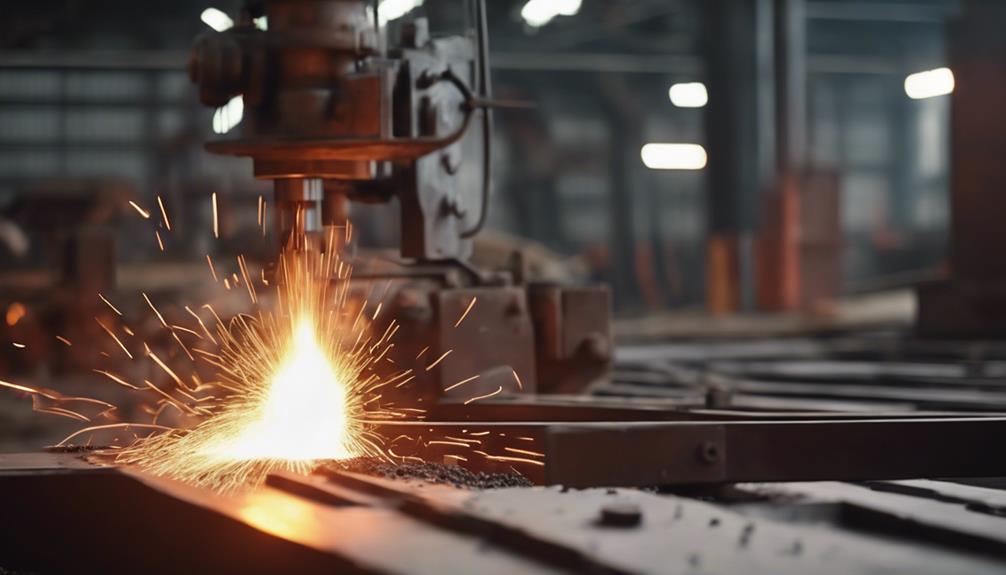
by Abdullah | May 8, 2024 | Steel Fabrication
Steel product manufacturing entails a process starting with sourcing iron ore, coal, and scrap steel globally. These raw materials are processed in plants for optimization. Melting and casting involve recycling steel in furnaces, then continuous casting into beams and shapes. Rolling techniques refine steel properties through hot and cold processes. Heat treatment alters steel properties while machining creates precise components. Surface finishing enhances appearance and durability. Cleaning and coating techniques prepare steel for various applications. The industry uses steel for construction, automotive, and more, known for its durability and versatility. Discover the intricate journey from raw materials to finished steel goods.
Key Takeaways
- Global sourcing of iron ore, coal, and scrap steel for production efficiency.
- Melting recycled steel in electric arc furnaces to reduce emissions.
- Hot and cold rolling techniques for shaping and improving properties.
- Heat treatment methods like annealing and quenching for altering steel properties.
- Surface finishing processes like galvanizing for corrosion resistance.
Raw Material Sourcing
Raw material sourcing is a critical initial phase in the Steel Product Manufacturing Process, involving the global acquisition of key resources like iron ore, coal, and scrap steel through various mining operations. The steel manufacturing industry heavily relies on the efficient supply chain of these raw materials to guarantee uninterrupted production. Core drilling and haul trucks are commonly utilized techniques for the extraction and transportation of iron ore and coal, vital elements in steel production. Additionally, steel raw materials undergo processing, such as unloading with stacker/reclaimers in coking and sinter plants, to prepare for the manufacturing process.
Efficient raw material processing is paramount for the steel industry as it ensures a steady and reliable supply chain for manufacturing finished steel products. By optimizing the sourcing and processing of raw materials, steel manufacturers can enhance production efficiency, reduce costs, and meet the demands of the market effectively. A well-organized raw material sourcing strategy sets the foundation for a successful steel manufacturing operation.
Steel Scrap Melting
In the steel manufacturing process, the transformation of recycled steel through the melting of steel scrap in electric arc furnaces stands as a crucial stage, driving resource efficiency and environmental sustainability. Steel scrap melting is a critical step that helps reduce the dependence on raw materials by utilizing recycled steel.
Electric arc furnaces are the primary method used for this process, relying on high-power electric arcs to generate the intense heat required to melt the steel scrap effectively. This approach not only aids in energy efficiency but also contributes to a reduction in greenhouse gas emissions compared to traditional steelmaking methods.
By melting scrap steel in electric arc furnaces, manufacturers can produce liquid steel, which serves as the foundation for creating a wide range of steel products.
Casting Into Various Shapes
How is steel transformed into various shapes like beams, slabs, and billets in the steel manufacturing process through the casting method?
The answer lies in the technique of continuous casting. In this process, molten steel is poured into cooled molds and then drawn out using guided rollers to allow for the steel to harden and solidify. By cutting the cooled and solidified steel into desired lengths, different steel shapes such as beams, slabs, and billets are obtained. Casting plays an important role in the steel manufacturing process as it gives steel its initial shape and form, setting the foundation for further processing and finishing.
Continuous casting stands out for its efficiency in the production of steel shapes. It enables a continuous flow of steel shapes to be created, allowing for seamless and efficient production. This method ensures that the steel shapes produced are of high quality and can undergo subsequent processes with ease. Continuous casting contributes significantly to the overall efficiency and productivity of steel manufacturing operations.
Hot Rolling Process
The hot rolling process in steel manufacturing involves heating the steel above its recrystallization temperature and passing it through rollers to achieve desired shapes. This method is crucial for reducing the thickness of steel slabs or ingots, leading to improved mechanical properties and surface finish.
By shaping steel into products like sheets, plates, and coils during hot rolling, manufacturers prepare the material for further processing in various industries. The high temperatures used in hot rolling play a significant role in creating a uniform grain structure, ultimately enhancing the overall strength of the steel produced.
This process is essential in steel production as it enables the creation of a wide range of products used in construction, automotive manufacturing, and other industrial applications. Hot rolling stands as a foundational step in the steel manufacturing process, ensuring that the steel meets the necessary standards for quality, durability, and functionality.
Cold Rolling Techniques
Utilizing cold rolling techniques, steel sheets or coils undergo a process at room temperature to precisely reduce their thickness and enhance their mechanical properties and surface characteristics. The cold rolling process involves passing the steel through a series of rollers that exert pressure to decrease the thickness while maintaining tight dimensional tolerances. This method results in improved surface finish, high strength, and excellent uniformity across the steel product.
Steel sheets produced through cold rolling find extensive use in various industrial applications due to their superior qualities. Industries such as automotive manufacturing, construction, and appliance production benefit from cold-rolled steel sheets’ precise thickness control and enhanced mechanical properties. These sheets can be manufactured as thin as 0.05mm, making them suitable for applications requiring thin yet strong materials, such as automotive body panels. The superior surface quality and dimensional accuracy offered by cold-rolled steel make it a preferred choice in industries that demand high-quality steel products.
Heat Treatment Methods
In steel manufacturing processes, heat treatment methods play an essential role in altering the material’s properties to meet specific requirements. These methods include annealing, quenching, and tempering.
Annealing is a process where steel is heated to a specific temperature and then slowly cooled to relieve internal stresses and increase ductility.
Quenching involves rapid cooling of the steel to trap carbon atoms within the crystal lattice, resulting in hardened steel. Following quenching, tempering is carried out to reduce the brittleness of the steel while maintaining its hardness and strength.
By carefully controlling the heating and cooling processes involved in these treatments, manufacturers can achieve the desired mechanical properties in the steel, making it suitable for various applications.
Additionally, hardening is another heat treatment method used to increase the hardness of steel by heating it to a critical temperature and rapidly cooling it. These methods are pivotal steps in producing steel products with the required strength, toughness, and durability.
Cutting and Machining Processes
Within steel manufacturing processes, the cutting and machining operations are important for shaping and creating precise components from steel materials. Cutting processes like sawing, shearing, and plasma cutting are utilized to shape steel into desired sizes, while machining processes such as milling, drilling, and turning are used to create precise shapes and holes in steel components.
Computer Numerical Control (CNC) machines play a significant role in steel manufacturing, offering accurate and automated cutting and machining operations. CNC machines guarantee efficiency and consistency in producing steel parts to exact specifications. Laser cutting technology is also widely used for its high precision in cutting steel sheets and plates for various industrial applications.
Expertise is essential in machining processes to guarantee the dimensional accuracy and surface finish of the final steel products, meeting quality standards and functional requirements in the steel manufacturing industry.
Surface Finishing Techniques
Surface finishing techniques play a pivotal role in enhancing the quality and functionality of steel products by improving their appearance and properties.
Shot blasting is a process where abrasive materials are propelled at high speeds onto the steel surface to eliminate rust, scale, or contaminants, preparing it for further treatment.
Pickling, on the other hand, involves treating the steel surface with acids to remove oxide layers, scale, and impurities, resulting in a clean and smooth surface for subsequent finishing.
Electroplating is a method that deposits a thin layer of metal, such as zinc or nickel, onto the steel surface through electrolysis to enhance corrosion resistance, appearance, or conductivity.
These techniques are essential in improving the durability, aesthetics, and functionality of steel products across various industries like construction, automotive, and manufacturing. Each method serves a specific purpose in ensuring that steel products meet the required standards for their intended applications.
Quality Control Measures
Quality control measures are essential components of the steel manufacturing process, ensuring the consistency, purity, and reliability of raw materials and final steel products. Raw materials testing plays a vital role in quality control, with iron ore, coal, and scrap steel undergoing rigorous analysis for purity and consistency. Technologies like spectroscopy and X-ray fluorescence are employed to assess the chemical composition of raw materials, ensuring quality assurance throughout the manufacturing process.
In addition to raw materials testing, quality control in steel production involves continuous monitoring of temperatures, pressures, and chemical reactions to maintain the desired properties of the steel. Various inspection methods such as dimensional inspections, non-destructive testing, and visual inspections are implemented at different stages to identify any defects or inconsistencies in the steel products. These measures are in place to meet industry standards, specifications, and customer requirements, ultimately delivering reliable and high-quality steel products to the market.
Industry Applications
The widespread utilization of stainless steel across various industries underscores its exceptional durability, corrosion resistance, and versatility in meeting diverse application requirements.
In the construction sector, stainless steel is favored for structural elements and cladding due to its durability and resistance to corrosion, ensuring longevity and structural integrity in buildings.
Within the food industry, stainless steel is the material of choice for kitchen equipment and utensils, thanks to its hygienic properties and ease of cleaning, meeting strict hygiene standards essential for food preparation.
The automotive industry benefits from stainless steel in exhaust systems and trim components, as it offers resistance to high temperatures and corrosion, enhancing the longevity and performance of these parts.
The versatility of stainless steel extends to various industries, including construction, food, and automotive, showcasing its adaptability and reliability in meeting the demanding requirements of different applications.
Frequently Asked Questions
What Is the Process of Manufacturing Steel Products?
The process of manufacturing steel products involves converting raw materials like iron ore into molten iron through methods like blast furnace. Refining the molten iron into raw steel via techniques like Basic Oxygen Steelmaking or Electric Arc Furnace, followed by shaping, treatment, and coating for final products.
What Is the Steel Making Process From Start to Finish?
The steel making process from start to finish involves melting iron ore, coal, and lime to produce molten iron, removing impurities through techniques like BOS or EAF, treating the raw steel for desired grades, continuous casting, and secondary forming processes like heat treatment and coating.
How to Manufacture a Steel Product?
To manufacture a steel product, raw materials like iron ore and coal are converted into liquid iron through furnaces. This liquid iron is then processed into steel using methods like oxygen and arc furnaces. Shaping, rolling, and finishing processes follow to create various steel products.
What Are the Methods of Production of Steel?
Steel production methods include basic oxygen steelmaking (BOS), electric arc furnace (EAF), and direct reduced iron (DRI) processes. These methods utilize various techniques like oxygen blowing, electric arcs, and reduction by natural gas or coal to produce high-quality steel products efficiently.
Conclusion
To sum up, steel product manufacturing involves a series of processes from raw material sourcing to the production of finished goods. These processes include:
- Steel scrap melting
- Casting into various shapes
- Hot and cold rolling techniques
- Cutting and machining processes
- Surface finishing techniques
- Quality control measures
The industry applications of steel products are vast and essential across various sectors such as construction, automotive, infrastructure, and manufacturing.

